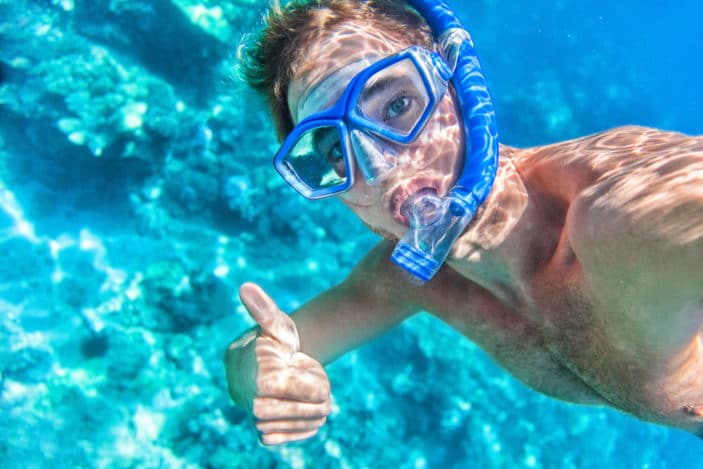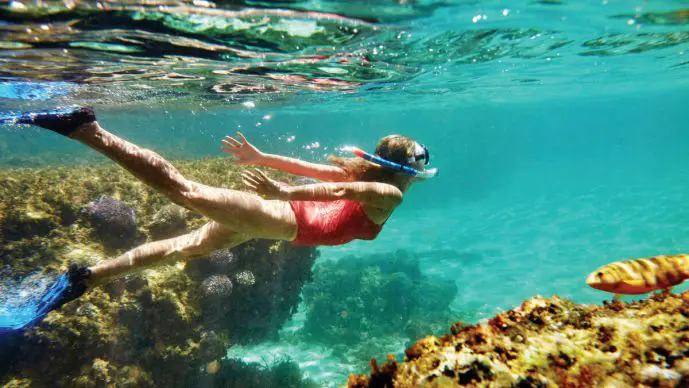Let’s face it, snorkeling is scary. There is something terrifying about the lack of predictability of what may happen when you delve into the deep unknown of the ocean. Before anyone is even allowed to dip their toes in the ocean to start snorkeling, they first have to be made aware of all the potential risks that you may be exposed to while doing the activity.
Now, that doesn’t mean that snorkeling is extremely dangerous, so don’t be afraid to try the sport out. But it is important to remember that the water is an environment much different from being on land and so there are no easy escapes from any mistakes that you make. However, if you follow instructions given to you by your snorkeling instructor and follow the basic snorkeling rules, it is important to be aware of what could go wrong and how you could avoid having to deal with these issues. Here are the risks that you may encounter when you are snorkeling and how you can avoid these risks.
The human body
Before we get into the danger that you can encounter because of snorkeling, we should first talk about the main thing that is likely to let you down when you start snorkeling, which is your own body. The human body is exceptionally fragile and people tend to forget just how tiresome and demanding snorkeling is as a sport. Though you may be a good swimmer in an average pool, your body can fall victim to a lot of ailments when you are exploring the depths of the ocean.
First of all, you can experience exhaustion. Swimming in the ocean isn’t like swimming in a pool on holiday, you can’t just jump out and take a five-minute break when you are feeling a little tired. Swimming and such depths while also accompanied by a large amount of equipment can be tiring, paired with a limitation in your oxygen intake could lead to fainting in the water which is incredibly dangerous. However, a good way people have tried to counter the difficulty of taking in oxygen when diving is wearing full-face masks. If you feel as though this is something that you would need, there are plenty of listings online for the best scuba mask for large faces.
Another issue that you could face when swimming is dehydration. If you are under the water for an extended period of time then you will not have the chance to take a sip of water. You will also be exercising your body substantially, which means you will be exhausting whatever water intake you already have. Before you go diving, make sure that you drink plenty of water, and if you feel as though you are starting to get dehydrated, don’t be afraid to resurface and take a small break.
Sunburn

A risk that you may not initially consider when scuba diving is the fact that you may fall victim to sunburn. Though sunburn isn’t exactly life-threatening, it is exceptionally painful and may lead to infection. You are more likely to get sunburn when you are underwater as water makes the sun’s rays more concentrated. Most sunscreens stop working when underwater too, which a lot of people may not notice. Though this is a risk, there are measures that you can take to prevent yourself from being burned. You can wear items of clothing such as rash guards, which will serve as a protective layer between yourself and the sun.
Hypothermia
If you are snorkeling, you may find yourself exploring some colder bodies of water. There are a lot of risks that come with being completely submerged in cold water and the main risk that you may face is hypothermia. Hypothermia is the last thing that you want to experience when you are snorkeling as it can lead to a lowered heart rate and confusion, which can really compromise your safety when you are underwater. There are some steps that you can take to prevent hypothermia from being an issue such as wearing a thick wetsuit or additional layers underneath.
Lack of experience
You may face a very common risk when snorkeling is falling victim to your own lack of experience. Though snorkeling may appear to be quite straightforward, there are actually a lot of technicalities that come into play when you are snorkeling. For example, you have to keep track of your time and also how far you have descended, which may be confusing for someone with little experience in the sport. Because of this, it is important to always snorkel supervised with someone who has a lot of experience in the area. These people can teach you all that you need to know about the subject and ensure that you follow all of the steps you need to follow to keep yourself safe.
Equalizing
This is another aspect of snorkeling that a lot of people neglect to think about in terms of risks. If you don’t properly equalize, then you will experience unbearable pressure in your ears which will be very uncomfortable and may distract you from keeping yourself safe in other ways. We recommend that you use the toynbee maneuver as a way to equalize as it is more effective than other techniques that snorkelers may use.
Technical error
One of the main issues when it comes to snorkeling is just how unpredictable the sport is. When you are underwater, you depend on a lot of equipment to keep you safe and though it is unlikely, sometimes this equipment can let you down. It is possible that an item in your setup may stop working when you are underwater, which could be detrimental to your health. Again, this can be avoided in a couple of ways. First of all, you should have all of your equipment regularly checked. There are plenty of companies that offer a full survey of all of your equipment, with a lot of focus on your scuba tank. Another way you can avoid falling victim to technical error is by diving with a friend who will notice whether or not your gear is working correctly.
Nitrogen Narcosis
Though this isn’t a very common risk, it is certainly a risk that may occur when you are snorkeling. Nitrogen Narcosis happens when you reach low depths when you are underwater and basically happens because you are inhaling gases at a point of high pressure, which can be overwhelming for the body. Nitrogen Narcosis can cause hallucinations and also take you in and out of consciousness, which can be extremely dangerous while you are in the water. To avoid this you really need to know your own depth limits. You shouldn’t need to go too deep when you are snorkeling anyway and if you are with a trained professional they should stop you from going too deep.
Training

The best way that you can avoid exposing yourself to any potential risks is by making sure that you receive all of the appropriate training that you may need. There really isn’t any room for cutting corners as any misinformation or lack of information could compromise your wellbeing. Before you even touch the water, you should undertake as much training as you possibly can. Training is easy to access if you know the right people and you should try to avoid general training classes. There are classes that specialize in certain important elements of snorkeling, such as how to handle equipment and your movement in the water.
Making sure that you are knowledgeable could potentially save your life in the future and so there really is no harm in ensuring that you are as well prepared as you can be.
